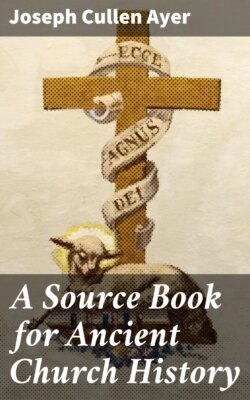Читать книгу A Source Book for Ancient Church History - Joseph Cullen Ayer - Страница 79
На сайте Литреса книга снята с продажи.
(b) Irenæus, Adv. Hær., I, 23. (MSG, 7:670.)
ОглавлениеSimon Magus. For additional source material, see Justin Martyr, Apol. I, 26, 56, Dial. c. Tryph., 120; Hippolytus, Ref. VI, 72 f. The appearance of Simon in the pseudo-Clementine literature (translated in ANF, VIII), presents an interesting historical problem. The [pg 079] present condition of investigation is given in the article “Clementine Literature” by J. V. Bartlett, in Encyc. Brit., eleventh ed.
Simon the Samaritan, that magician of whom Luke, the disciple and follower of the Apostles, says: “But there was a certain man, Simon by name,” etc. [Acts 8:9–11, 20, 21, 23.] Since he did not put his faith in God a whit more, he set himself eagerly to contend against the Apostles, in order that he himself might seem to be a wonderful being, and studied with still greater zeal the whole range of magic art, that he might the better bewilder the multitude of men. Such was his procedure in the reign of Claudius Cæsar, by whom also he is said to have been honored with a statue on account of his magic. This man, then, was glorified by many as a god, and he taught that it was he himself who appeared among the Jews as the Son, but descended in Samaria as the Father, while he came to other nations in the character of the Holy Spirit. He represented himself as the loftiest of all powers, that it is he who is over all as the Father, and he allowed himself to be called whatsoever men might name him.
Now this Simon of Samaria, from whom all heresies derive their origin, has as the material for his sect the following: Having redeemed from slavery at Tyre, a city of Phœnicia, a certain woman named Helena,38 a prostitute, he was in the habit of carrying her about with him, declaring that she was the first conception [Ennœa] of his mind, the mother of all, by whom he conceived in his mind to make the angels and archangels. For this Ennœa, leaping forth from him and comprehending the will of her father, descended to the lower regions and generated angels and powers, by whom, also, he declared this world was made. But after she had generated them she was detained by them through jealousy, because they were unwilling that they should be regarded as the progeny of any other being. As to himself, he was wholly unknown to them, but his Ennœa was detained by those powers and [pg 080] angels who had been produced by her. She suffered all kinds of contumely from them, so that she could not return upward to her father, but was even shut up in a human body and for ages passed in succession from one female body to another, as from one vessel to another vessel. She was in that Helen on whose account the Trojan War was undertaken; wherefore also Stesichorus was struck blind, because he cursed her in his poems; but afterward, when he had repented and written those verses which are called palinodes, in which he sung her praises, he saw once more. Thus passing from body to body and suffering insults in every one of them, she at last became a common prostitute; and she it is who was the lost sheep.
For this purpose he himself had come, that he might win her first and free her from chains, and confer salvation upon men by making himself known to them. For since the angels ruled the world poorly, because each one of them coveted the principal power, he had come to mend matters and had descended, been transfigured and assimilated to powers and angels, so that he might appear among men as man, although he was not a man; and that he was supposed to have suffered in Judea, although he had not suffered. Moreover, the prophets inspired by the angels, who were the makers of the world, pronounced their prophecies; for which reason those who place their trust in him and Helena no longer regard them, but are free to do what they will; for men are saved according to his grace, and not according to their righteous works. For deeds are not righteous in the nature of things, but by mere accident and just as those angels who made the world have determined, seeking by such precepts to bring men into bondage. On this account he promised that the world should be dissolved and that those who are his should be freed from the rule of them who made the world.
Thus, then, the mystic priests belonging to this sect both live profligately and practise magical arts, each one to the extent of his ability. They use exorcisms and incantations, [pg 081] love-potions, also, and charms, as well as those beings who are called “familiars” [paredri] and "dream senders" [oniropompi], and whatever other curious arts can be had are eagerly pressed into their service.
